All photos were taken during April 2024 by a photographer who wishes to remain anonymous due to the dangers of photography in the state.
In Nyala, South Darfur, the war has not just destroyed homes and displaced families; it has also harmed the environment. Forests have vanished, water is polluted or not within the reach, and farming has become nearly impossible in many areas. However, despite all of this, people are doing what they can to adapt, survive, and even rebuild. As these crises unfold, local communities are forging innovative, small scale responses to protect their environment and livelihoods. ‘Our trees are gone, but we are still here. We must find a way to live,” says Fatima Musa, a 37-year-old primary school teacher in Nyala.
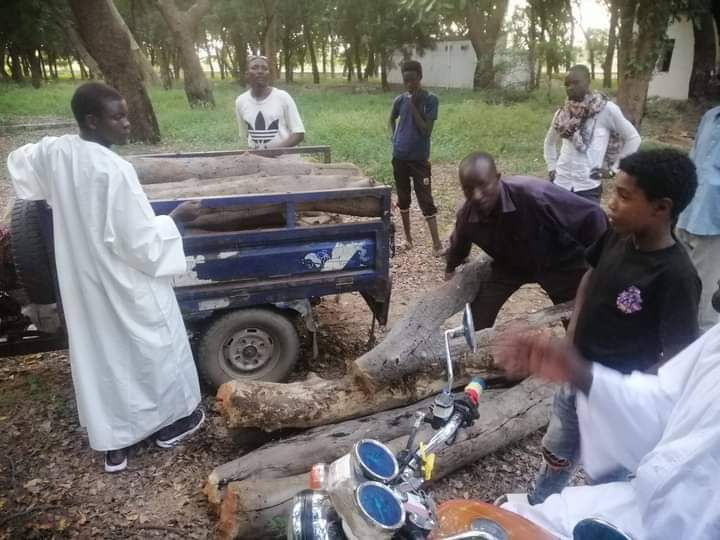
Deforestation by citizens driven by their urgent needs. Source: Anonymous
Environmental Impacts of Conflict in Nyala
Deforestation and land degradation:
A 2023 satellite-based survey by UNEP confirmed that over 70% of tree cover in South Darfur has been lost in the past decade, accelerating soil erosion and degrading local climate conditions. According to Adam Alahj, an environmental expert based in the Netherlands and a researcher of Kondowa Forest: “Darfur’s forests acted as buffers—not only for the environment but for social stability. When they disappear, everything else becomes more fragile: food systems, rainfall patterns, and even public health.”
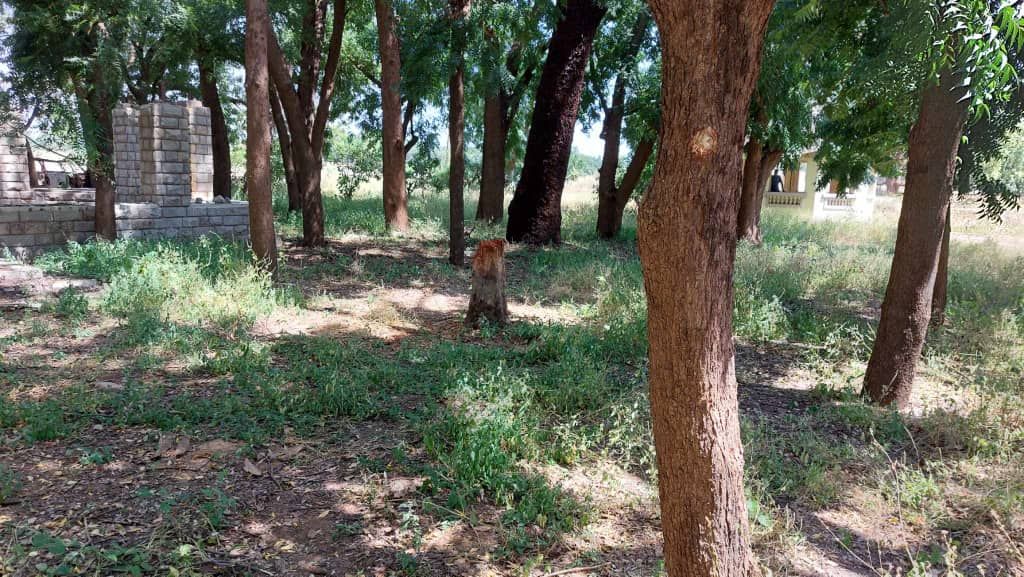
Neem forest after the start of cutting and impact with bombs and missiles. Source: Anonymous
The complete destruction of Kondowa Forest since 2015 has resulted in significant biodiversity loss and diminished ecological stability in the region. The neem forest, valued for its medicinal properties, was threatened as residents cut down trees to meet their immediate needs for firewood and shelter. This loss has increased soil erosion and further weakened the ecosystem's ability to support both agriculture and livelihoods. ‘The goal was not to cut down the trees, but we had to cut them down to eat and live,’ explains Hussein Abakar, a 45-year-old farmer living near the edge of the forest.
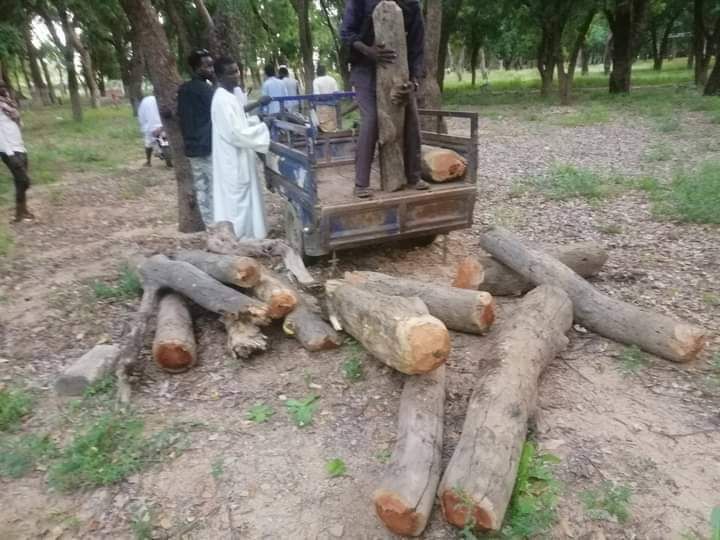
Absence of law enforcement and the lack of alternative sources of fuel leads to more unregulated deforestation. Source: Anonymous
An environmental and sustainability expert, Hatim Rijal, noted "Nyala, the capital of South Darfur State, has been deeply affected by the ongoing war, much like other urban centers. Natural resources—including forests, rangelands, and wildlife—have suffered severe degradation. Deforestation and illegal logging have increased significantly due to the absence of law enforcement and the lack of alternative sources of fuel, forcing people to rely heavily on forest resources. These pressures are further intensified by the impacts of climate change, particularly in the localities of South Darfur. Caught at the heart of the conflict, local communities have found themselves with few, if any, options beyond coping with these worsening conditions."
Water scarcity and pollution:
The Nyala Valley, once a vital source of water for residents, has become dangerously polluted. Conflict-related damage, the collapse of waste management systems, and the accumulation of debris have all contributed to the contamination of this critical water source. As a result, the health risks have surged particularly for vulnerable groups such as children and the elderly. Access to clean water is now extremely limited, sparking tension and competition among residents. According to data from the Ministry of Health, cases of waterborne diseases have increased by an alarming 80% compared to previous years. With traditional water systems failing, many families have no choice but to rely on unsafe or distant sources. "We had tap water before. Now we rely on a single open well. Diarrhea is constant,” says Amina Ibrahim, a mother of four in Otash camp.
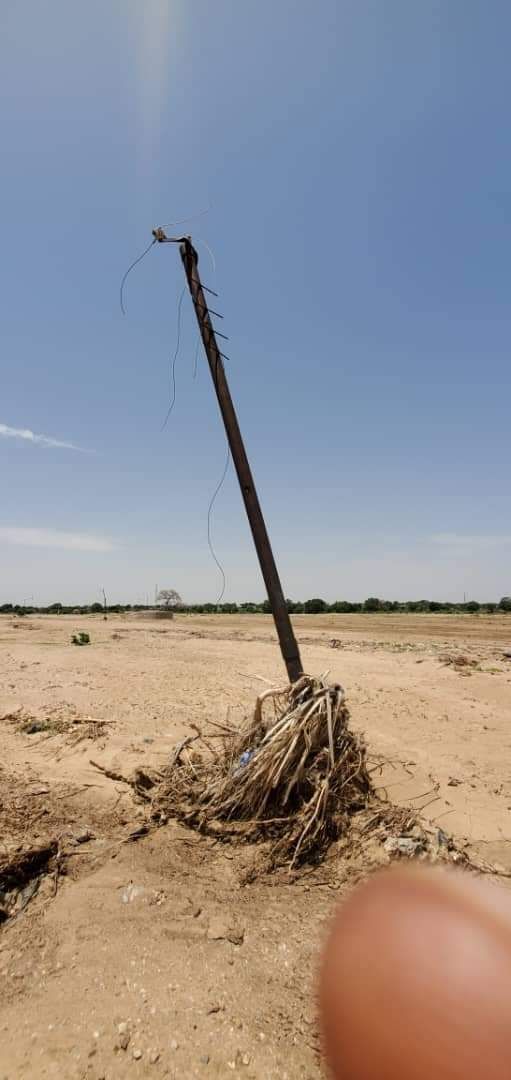
Nyala Burley Valley, which is the source of water . Source: Anonymous
Agricultural Disruption:
Agriculture has long been the backbone of Nyala’s local economy, but ongoing conflict has devastated the sector. Thousands of farmers have been displaced, forced to abandon their land. Without regular care and cultivation, the soil has deteriorated—eroded by wind, neglect, and inconsistent rainfall. Climate change has only made matters worse. Shifting weather patterns have disrupted growing seasons, making food production unpredictable. As a result, food insecurity has become widespread, and many households now face deepening economic strain with fewer resources to fall back on. ‘‘Our land is no longer fertile. Even if the fighting stops, it will take years to grow again,” says Yagoub Adam, a displaced agro-pastoralist from Mershing.
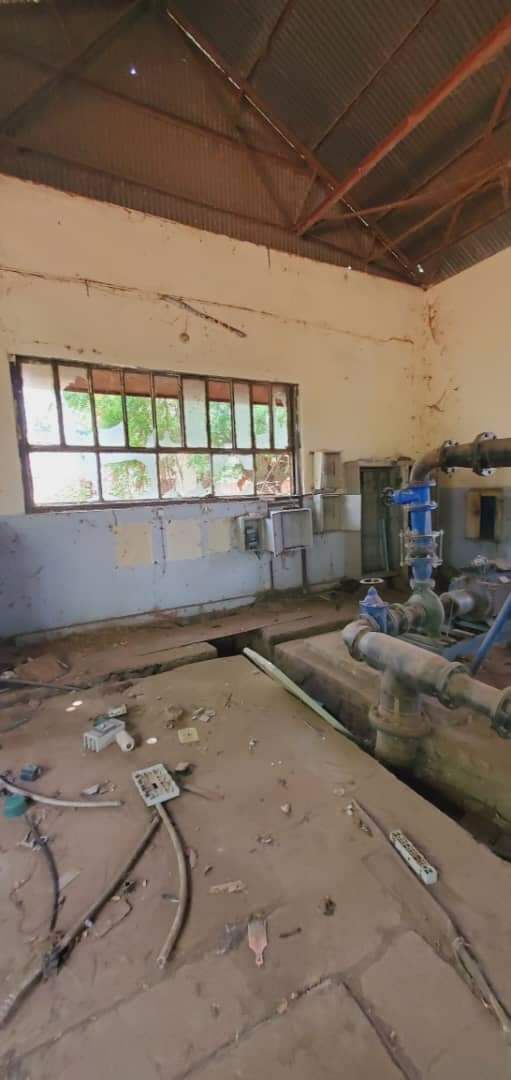
Nyala water station after damage due to missiles and bombs. Source: Anonymous
A joint report by FAO and WFP (June 2023) warned that over 4.5 million people in Darfur are facing acute food insecurity, worsened by both war and climate shocks.
Social Adaptations:
The social cohesion, which was rooted in Darfurian culture, becomes hard to see. The common memory and public spaces are ruined, as is the environment. The loss of social cohesion is harder to see, but just as painful. Schools are closed, healthcare centers are destroyed, and public gathering spaces like Nyala Cinema are now rubble.
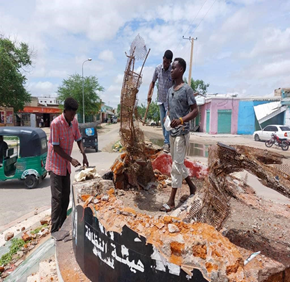
Nyala Cinema intersection, which is a historical tourist landmark in the city after the destruction. Source: Anonymous
However, in response, young people in Nyala have launched informal efforts such as "Nyala will Recover" to reclaim memory and rebuild social spaces. Volunteers have begun restoring symbolic sites, organizing clean-up days, and repainting walls in bombed-out neighborhoods. These social adaptations are not only psychological tools, they also represent a quiet, powerful form of environmental stewardship and civic resistance. ‘What we have lost will take years to recover. But we can’t wait, so we start with what we have,” says Hammed Abdurrahman, a 22 year old youth volunteer rebuilding monuments with Nyala Youth for Recovery Initiative.
Youth groups have begun repainting damaged murals and schools, clearing bomb debris from streets, and replanting native trees in public areas. They are coordinating using a large group on the platform Facebook.
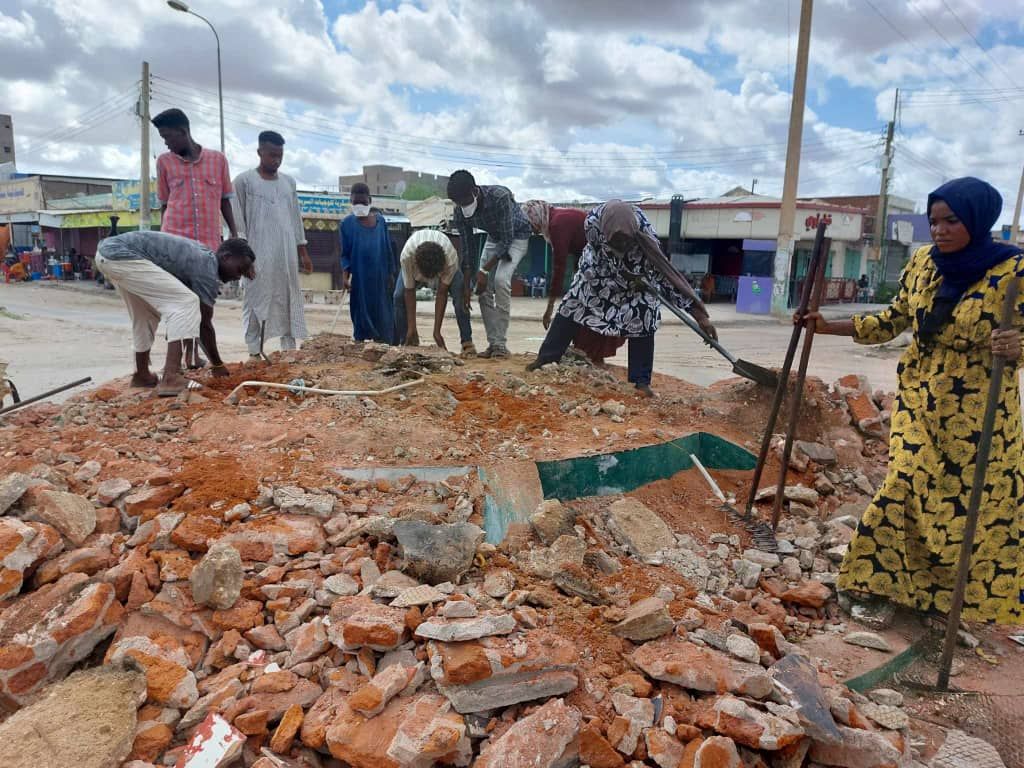
Nyala Will Recover Initiative during the reconstruction of Nyala Cinema Intersection. Source: Anonymous
Conclusion and Recommendations for Support and Sustainability
Nyala is bleeding; its forests stripped bare, its water poisoned, its farmers uprooted. What was once a thriving ecosystem and a proud community is now struggling for breath under the weight of conflict, neglect, and environmental collapse. But Nyala is not giving up. In the face of devastation, its people are rising. Young volunteers are restoring shattered landmarks, families are harvesting rainwater in defiance of drought, and farmers are testing new ways to grow food on scarred land.
These are not just acts of survival; they are declarations of hope, ownership, and resistance. Still, hope cannot shoulder this burden alone. Nyala’s recovery cannot be left to the courage of its people. It demands urgent, coordinated intervention, investment in clean water systems, reforestation in safe zones, and support for sustainable agriculture.
It calls for donors, policymakers, and international actors to act not with pity, but with purpose. If the world continues to look away, we risk losing more than a city we risk losing a model of resilience. However, if we support its resilient communities now, Nyala can rise again not just from the rubble, but as a blueprint for how communities survive, adapt, and rebuild with dignity.
Will the world meet Nyala halfway or will it leave it to fend for itself? Local efforts are inspiring but not enough. Based on interviews, field notes, and community discussions, we recommend:
- Reforestation efforts, prioritizing neem and acacia, led by local groups.
- Emergency water access projects (solar-powered boreholes, filters).
- Support for small-scale regenerative agriculture, especially those led by youth and women.
- Safe spaces and psychosocial support, to preserve social fabric and memory.
